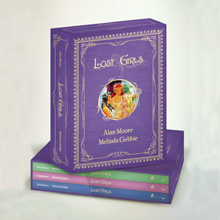home | metro silicon valley index | the arts | books | review

Exotic Perfume: 'Lost Girls' puts a high price on desire.
E Is for Erotica
Alan Moore and Melinda Gebbie put the graphic back in graphic novels with 'Lost Girls'
By Richard von Busack
SAYS THE decadent hotel-keeper M. Rouger in Lost Girls, "Fiction and fact. ... Only madmen and magistrates cannot discern between them." Some magistrates may fear cartoon fantasies feeding copycats, thanks to Alan Moore (V for Vendetta) and his partner, Melinda Gebbie.
While Lee's Comix in Mountain View is stocking Lost Girls, you can smell the telltale odor of hot potato already. As Rory Root of Berkeley's store Comic Relief told comicbookresources.com, "I suspect the book will end up in court." Gebbie and Moore are metaphorically elegant in their three-volume set of graphic-novel erotica—note the botanical "aromatic sepals" or the aquatic "cerise manta" for the vulva. But the two cross more dangerous frontiers than the usual fantasists. They reimagine, for instance, the Lost Boys of Peter Pan as sexually active boys. In the third volume, Gebbie appropriates the artistic style of the Marquis von Bayros—a vintage pornographer of exquisitely delineated libertines—for a fiction-within-a-fiction of minors joining in a family orgy.
Lost Girls' unfolds at the Hotel Himmelgarten "on the Austrian border" in spring 1914. There, three ladies of leisure meet. The aging Lady Alice Fairchild has just arrived from the African colonies. Wendy Potter, a London matron, is accompanying her dull husband, a naval armaments engineer. Lastly comes the freckled, naive, but far from virginal Dotty Gale.
The ladies discover they share a ravenous sexual appetite. They also have a taste for storytelling and an uncertainty of where fantasy began and reality ends. Recognize the three? Alice is the remains of the child who went down the rabbit hole. Dotty is the farm girl who rode a tornado. And Wendy was once lured out the window by a boy named Peter.
Moore and Gebbie posit their adventures as different versions of the ones chronicled by the firm of Baum, Barrie and Carroll. Alice was a product of Sapphic Victorian girls' schools. On the farm, Dorothy works her way through three muscular farmhands of little brain, courage and heart. And Wendy leaves her consensually incestuous nursery in favor of the city park where the street-urchin Peter plays.
Lost Girls begins with a mirror and concludes with a rifle butt shattering glass. The year 1914 is the hinge of the modern and the old world. The Great War is about to break out. And the Freudian world is stirring, ready to overturn the world of fantasy.
As an illustrator, Gebbie straddles the cusp of the Victorian and modernist eras. On a women-only picnic, augmented with opium, Fauvist colors break out like a sudden storm; the ladies transform into Rousseau beasts. Gebbie assays both the spidery lines of Aubrey Beardsley and the mottled green-gray passions of Egon Schiele. She also imagines Alphonse Mucha designs for a series of stained-glass windows honoring the Seven Deadly Sins.
Moore, who may be the most respected comics writer alive, has risked his reputation to find out whether people mean it when they talk about freedom of speech. In this elegantly mounted work, he and Gebbie put the graphic back into the graphic novel. Reading Lost Girls, head swimming a little, one remembers the bursting vividness of the first underground comics when they came out. These late 1960s comics argued that fantasies of making love were as valid as the fantasies of violence that make up much of the comic-book realm. But underground comix were bulbously silly, sometimes deliberately ugly. Lost Girls, as regally illustrated as it is thoroughly scandalous, calls pornography "the enchanted parkland where the most secret and vulnerable of our many selves can play."
The artists have one other point. It's made through reference to the coming of World War I, the focus of dark male fantasies of conquest and glory. Lost Girls does seduce the innocent: the innocent, that is, who can't understand the need for war, when there are beds that need to be filled, sheets that need to be wrecked.
Lost Girls, by Alan Moore and Melinda Gebbie; Top Shelf; $75 cloth
Send a letter to the editor about this story.
|
|
|
|
|
|